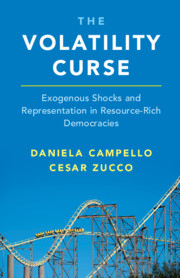My research addresses topics in international and comparative political economy. My core research has focused on the consequences of economic integration for democracy, accountability, and prospects of income redistribution in emerging economies. I am also interested in economic voting, the politics of foreign direct investment and political risk, and Latin American politics. Click here for my C.V. in pdf format.
Books

“The Politics of Market Discipline in Latin America” (Cambridge University Press 2015)
In this book, I employ a combination of formal theory, large-N empirical analyses, as well as in-depth case studies of Brazil, Ecuador, Venezuela and Argentina, to shed light on the inner workings and long term consequences of ians during national elections. It identifies how financial markets respond to the victory of the left, and determines the political and economic financial markets’ influence on economic policymaking. The book focuses on the interaction between investors and politic conditions under which market responses push leftist governments into adopting a conservative economic agenda. The book also explains why market discipline, imposed during elections, leads to long-term ideological convergence between left and right-wing economic policies in some political systems but not in others.

“The Volatility Curse: Exogenous Shocks and Representation in Resource-Rich Democracies” (with Cesar Zucco, Cambridge University Press 2020)
Economic voting is both a widespread empirical regularity and an optimistic theory of democracy. Even with uninformed voters, elections can provide good incentives for governments and, therefore, ensure good democratic representation. The “Volatility Curse” shows that such optimism in unwarranted in developing democracies that are strongly dependent on natural resources and on inflows of foreign capital. Not only these countries are much more economically volatile than their developed counterparts, but much of this volatility is induced by international factors that are not controlled by their own governments. Under these circumstances, voters face the insurmountable task of comparing incumbents governing under extremely different conditions, which leads to voters judging governments more on their luck than on their competence. Economic voting, in short, does not provide positive incentives for governments in contexts of extreme exogenously induced economic volatility that are typical of the developing world.
Articles and Chapters
- (2025) “Anti-China Sentiment and the Politics of Brazilian Agribusiness”. 2025. In Manfred Elsig and Andrew Lugg (ed.), Globalization in Latin America: The Law, Politics and Economics of Preferential Trade Agreements. Cambridge University Press, New York.
- (2022) “When Incompetence Meets Bad Luck: Bolsonaro’s Third Year In the Brazilian Presidency”. Revista de Ciencia Politica, 42(2): 203-223.
- (2021, with Francico Urdinez) “Voter and Legislator Responses to Localized Trade Shocks from China in Brazil” (Comparative Political Studies, 54(7): 1131-1162.
- (2020, with Cesar Zucco) “Endogenous Policymaking.” The Journal of Politics 82(2): 800-807.
- (2020, with Anya Schiffrin, Karine Belarmino and Debora Thome) “Captured Media? Examining Brazilian Coverage of Lava Jato.” In Paul Lagunes and Jan Svejnar (ed.), Corruption and the Lava Jato Scandal in Latin America. Routledge, New York.
- (2018) “Retrospective Voting and Democratic Accountability” In Barry Ames (ed.), Routledge Handbook of Brazilian Politics. Routledge, New York.
- (2016, with Cesar Zucco) “Presidential Success and the World Economy.” The Journal of Politics, 78(2): 589-602. Supplemental information, data, and replication materials are available here.
- (2015, with Leany Lemos) “The Non-Ratification of Bilateral Investment Treaties in Brazil: A Story of Conflict in a Land of Cooperation.” Review of International Political Economy, 22(5): 1055-1086.
- (2015) “Institucionalização Partidária e Consistência Programática: A Resposta da Esquerda a Ataque Especulativos na América Latina.” Dados – Revista de Ciências Sociais, 58(2): 427-460.
- (2015, with Cesar Zucco) “Understanding the Increasing Popularity of Brazilian Presidents.” in Jeffrey D. Needell, ed., Emergent Brazil: Key Perspectives on a New Global Power. Gainesville: University Press of Florida.
- (2015) “Does the Institutionalization of Party Systems Matter? Speculative Attacks and Political Responsiveness in Latin America.” in Torcal, Mariano (ed.) Institucionalización de los Sistemas de Partidos en Latinoamérica. Fundación CIDOB. CIS Press. Madrid.
- (2014) “The Politics of Financial Booms and Crises: Evidence from Latin America.”Comparative Political Studies 47(2): 260-286. – Data – R Script – Coding of Campaigns and Elections *** Awarded the James Caporaso prize for best paper published in Comparative Political Studies for 2014
- (2012) “The Politics of Global Financial Markets in Latin America.” In Santiso, Javier and Dayton-Johnson, Jeff (ed.) The Oxford Handbook of Latin American Political Economy. Oxford University Press, New York.
- (2011) “The Politics of Redistribution in Less Developed Democracies: Evidence from Brazil, Ecuador and Venezuela” in Blomfield, Merike (ed.) The Great Gap: Inequality and the Politics of Redistribution in Latin America. ed. Penn State Press.
- (2008, with Cesar Zucco) “The Left in an Unequal and Open Democracy: An Analysis of Brasil Under Lula” In Moreira, Carlos et al (ed.) La Nueva Política en América Latina: Rupturas y Continuidad. Trilice, Montevideo.(with Cesar Zucco)
